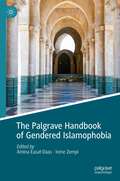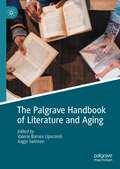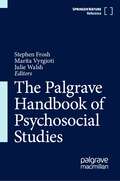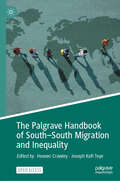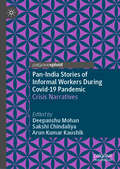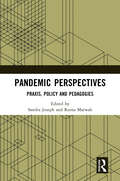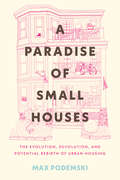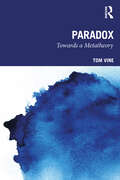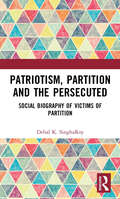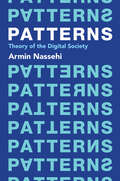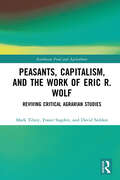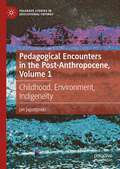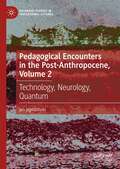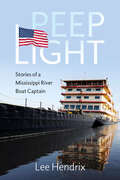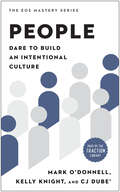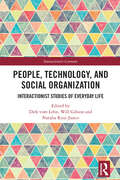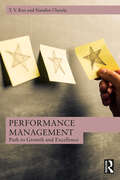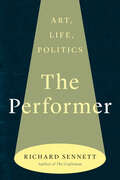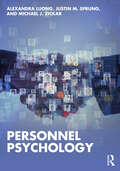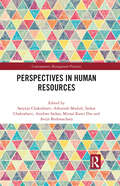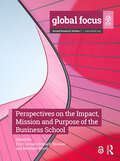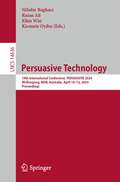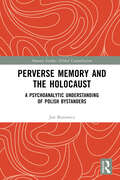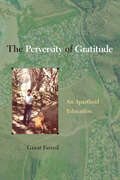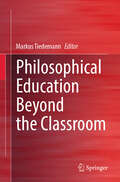- Table View
- List View
The Palgrave Handbook of Gendered Islamophobia
by Irene Zempi Amina Easat-DaasAgainst a backdrop of continually growing global Islamophobia, this handbook provides a comprehensive, interdisciplinary overview of the key issues, theories, debates, and developments in gendered Islamophobia, unpacking how Western, Orientalist constructions of Muslim men and women affect the lived experiences of Muslim men and women; impact social, legal, and criminological policies, practices, and discourse; and give rise to resistance against gendered Islamophobia. Drawing on theories from philosophy, sociology, gender studies, psychology and criminology, sections examine the interdisciplinary theoretical dimensions of gendered Islamophobia; illustrate the dynamics of gendered Islamophobia through the use of case examples in the UK, Europe, North America, Australasia, the Middle East, and South Asia. This handbook will be valuable reading for scholars, researchers, and policymakers around the globe in Gender Studies, Sociology, Criminology, Politics, and Law, whofocus on the intersections of gender and Islamopobia, and the impact on Muslim men and women respectively.
The Palgrave Handbook of Literature and Aging
by Valerie Barnes Lipscomb Aagje SwinnenThis handbook offers a comprehensive survey of the growing field of literary age studies and points to new directions in scholarly research. Divided into four sections, the volume reflects the current conversations in the field: intersections and intersectionalities, traveling concepts, methodological innovations, and archival inquiries. It encompasses the spectrum of critical approaches that literary age studies scholars employ, from environmental studies and postcolonial theory to critical race theory and queer studies. While close reading continues to be a mainstay of literary criticism, the handbook highlights alternative tools and routes in both data elicitation and analysis. The final part of the book shows the burgeoning interest in the field from literary scholars across historical periods, extending the scope of literary age studies beyond contemporary texts. This is an essential reference work for advanced students and scholars of literary studies, gerontology, age/aging studies, interdisciplinary studies and cultural studies.
The Palgrave Handbook of Psychosocial Studies
by Stephen Frosh Marita Vyrgioti Julie WalshOver the past decades, psychosocial studies has demonstrated its strengths and influence across diverse sites of theory and practice; it continues to grow as an area of transdisciplinary research that dialogues with psychoanalysis, sociology, critical psychology, cultural studies, gender and sexuality studies, and postcolonial studies. The Palgrave Handbook of Psychosocial Studies is the first Major Reference Work to explore the history and depth of the field and offer a critical evaluation of contemporary theories, empirical methods and practices of psychosocial studies. With 50 chapters, this state-of-the-art collection:· reflects back on texts that have influenced the development of psychosocial studies from a 2020s perspective· explores current major topics with evaluative reviews· identifies newly emerging areas ofenquiry · features a wide range of international psychosocial voices. Published chapters can be read and downloaded individually online: https://link.springer.com/referencework/10.1007/978-3-030-61510-9 The Palgrave Handbook of Psychosocial Studies is unique in covering a wide range of psychosocial topics and in being written accessibly from many different perspectives. It will appeal to students, scholars and practitioner-researchers alike.
The Palgrave Handbook of South–South Migration and Inequality
by Heaven Crawley Joseph Kofi TeyeThis open access handbook examines the phenomenon of South-South migration and its relationship to inequality in the Global South, where at least a third of all international migration takes place. Drawing on contributions from nearly 70 leading migration scholars, mainly from the Global South, the handbook challenges dominant conceptualisations of migration, offering new perspectives and insights that can inform theoretical and policy understandings and unlock migration’s development potential. The handbook is divided into four parts, each highlighting often overlooked mobility patterns within and between regions of the Global South, as well as the inequalities faced by those who move. Key cross-cutting themes include gender, race, poverty and income inequality, migration decision making, intermediaries, remittances, technology, climate change, food security and migration governance. The handbook is an indispensable resource on South-South migration and inequality for academics, researchers, postgraduates and development practitioners.
Pan-India Stories of Informal Workers During Covid-19 Pandemic: Crisis Narratives
by Deepanshu Mohan Sakshi Chindaliya Arun Kumar KaushikThis book aims to delve into the application of feminist ethnography by engaging with the lived experiences of vulnerable workers, occupied by India’s informal workforce, across its deeply stratified labour-market landscape. Set up and organized in a diverse spatial trajectory through identified case studies from across India, the book, in a post pandemic context, aims to study, critically reflect on the vulnerable state of India’s workforce, capturing the daily emergencies, livelihood of marginalized communities. Case studies in the book feature the pandemic-crisis narratives of farmers, fisherfolk, factory workers, artisans, small scale entertainment providers, sanitation, and waste workers, to name a few.By understanding the intersectional dimensions of social structures like caste, gender, and class our case studies in the book also attempt to unpack the ‘dualities’ present in the contemporary understanding of India’s labour market. Reflective discussions with field ethnographers through first-person narratives help documenting their own observations from different case studies, while focusing on interactions on how to work through power dynamics and varied positionalities across dynamic field sites marked with different spatial characteristics. The text is primarily aimed at students and peer scholars of development studies, or for those who interested in learning about the application of ethnographic methods to studying/understanding the governing dynamics of informality across India and South Asia.
Pandemic Perspectives: Praxis, Policy and Pedagogies
by Reena Marwah Sandra JosephThe book explores the impacts of the COVID-19 pandemic on nations across the globe since early 2020. It hosts a variety of perspectives within economic, social and development research studies, providing contemporary and proper information. The book also presents policy prescriptions for developing economies, critiques the system of disease surveillance and waste management, and defines a vision for India's development. It also mirrors issues related to digitisation, marginalisation, government regulations and health systems and provides original ideas for innovative methodologies suitable for higher education.Print edition not for sale in South Asia (India, Sri Lanka, Nepal, Bangladesh, Pakistan and Bhutan)
A Paradise of Small Houses: The Evolution, Devolution, and Potential Rebirth of Urban Housing
by Max PodemskiFrom the Haitian-style &“shotgun&” houses of the 19th century to the lavish high-rises of the 21st century, a walk through the streets of America&’s neighborhoods that reveals the rich history—and future—of urban housingThe Philadelphia row house. The New York tenement. The Boston triple-decker. Every American city has its own iconic housing style, structures that have been home to generations of families and are symbols of identity and pride. Max Podemski, an urban planner for the city of Los Angeles and lifelong architecture buff, has spent his career in and around these buildings. Deftly combining his years of experience with extensive research, Podemski walks the reader through the history of our dwelling spaces—and offers a blueprint for how time-tested urban planning models can help us build the homes the United States so desperately needs.In A Paradise of Small Houses, Podemski charts how these dwellings have evolved over the centuries according to the geography, climate, population, and culture of each city. He introduces the reader to styles like Chicago&’s prefabricated workers cottages and LA&’s car-friendly dingbats, illuminating the human stories behind each city&’s iconic housing type. Through it all, Podemski interrogates the American values that have equated home ownership with success and led to the US housing crisis, asking, &“How can we look to the past to build the homes, neighborhoods, and cities of the future that our communities deserve?&”
Paradox: Towards a Metatheory
by Tom VineHistory reveals countless attempts by great minds to solve life’s paradoxes. But what if these attempts miss the point? What if paradox is life? Contrary to the supposedly sublime linear logic that underpins our prevalent modes of theoretical and empirical enquiry, in this fascinating book, organizational anthropologist Tom Vine charts the pervasiveness of paradox across the academy: from arithmetic to zoology. In so doing, he reflects on the concept of paradox as a widespread existential ‘pattern’, a pattern which holds significant metatheoretical and pedagogical potential. Paradoxes, he argues, are not inconveniences or ‘fault lines in our common-sense world’ but are coded into our very existence. Paradoxes thus present their own vital logics that shape our lives: they thwart moral and ideological uniformity; they even out subjective experience between ‘the haves’ and ‘the have nots’; and they shed light on the opaque concepts of consciousness and agency. This book will appeal to anybody with a curious mind, particularly scholars and students with an interest in one or more of the following: complexity theory, critical pedagogies, ethnography, nonlinear dynamics, organization theory, and systems theory.
Patriotism, Partition and the Persecuted: Social Biography of Victims of Partition
by Debal K. SinghaRoyThis book explores the theme of continuous wreaking of brutal persecution of a Hindu family on the one hand and the uncompromising efforts of Muslim friends and neighbours to protect this family on the other. It is set against the resultant and barbaric forces let loose after the propagation of the two nation theory, and the ultimate partition of India in 1947. Based on the soical biography of a Hindu family that stayed back in East Pakistan, it traces their journey, how they became 'other' in the country of their birth and faced persecution. This, being branded the other, led to part of the family migrating to Inida, away from their natal roots. The 1965 India-Pakistan war further brought prolonged separation and sufferings for these half-families living on both sides of the borders. Subjecting one to encounter helplessness, uncertainty and poverty in India, and the other to state sponsored apathy, coercion, arrests and physical tortures. The vicious atmosphere of violent communal aggression though did not stop their Muslim friends from protecting them. When the Muslim friend was killed by the religious fanatics in the newly liberated Bangladesh, the left behind member of the Hindu family realized that it was time to leave their motherland for India, where they died with the desire to go back to their motherland, buried along with them. Despite prolonged violence and tragic separation thereafter, numerous memories of the self-sacrificing efforts of the compatriots served as recollection in collective living in the Indian subcontinent.
Patterns: Theory of the Digital Society
by Armin NassehiWe are inclined to assume that digital technologies have suddenly revolutionized everything – including our relationships, our forms of work and leisure, and even our democracies – in just a few years. Armin Nassehi puts forward a new theory of digital society that turns this assumption on its head. Rather than treating digital technologies as an independent causal force that is transforming social life, he asks: what problem does digitalization solve? When we pose the question in this way, we can see, argues Nassehi, that digitalization helps societies to deal with and reduce complexity by using coded numbers to process information. We can also see that modern societies had a digital structure long before computer technologies were developed – already in the nineteenth century, for example, statistical pattern recognition technologies were being used in functionally differentiated societies in order to recognize, monitor and control forms of human behaviour. Digital technologies were so successful in such a short period of time and were able to penetrate so many areas of society so quickly precisely because of a pre-existing sensitivity that prepared modern societies for digital development. This highly original book lays the foundations for a theory of the digital society that will be of value to everyone interested in the growing presence of digital technologies in our lives.
Peasants, Capitalism, and the Work of Eric R. Wolf: Reviving Critical Agrarian Studies (Earthscan Food and Agriculture)
by Mark Tilzey Fraser Sugden David SeddonFifty years after the publication of Eric Wolf’s celebrated Peasant Wars of the Twentieth Century, and forty years after the publication of his path-breaking Europe and the People Without History, this book offers a much-needed critical assessment and update of Wolf’s contribution to the study of the peasantry and its relationship to capitalism, the state, and imperialism. This book provides a comprehensive evaluation of Wolf’s premises, methodology, and understanding of the peasantry, and its relationship to the rise of capitalism and the modern state. The authors analyse Wolf’s theoretical approach and, by building on his work in Europe and the People Without History especially, argue their own position concerning the dynamics of the peasantry in relation to capitalism, state, class, and imperialism. Further, the text aims to answer the agrarian question more widely, focusing on agrarian society and the political role of the peasantry in contested transitions to capitalism and to modes beyond capitalism. This requires, the authors argue, an analysis of class struggle and of the resources, material and discursive, that different classes can bring to bear on this struggle. Based on well-founded theoretical premises, the book focuses on the contested rise of capitalism in the global North, the development of core–periphery relations in the global political economy, and the place of the peasantry in these dynamics. The book presents case studies of transitions to agrarian capitalism in the British Isles, France, Germany, Japan, and the USA. The book will be of great interest to students and researchers in the areas of peasant studies, rural politics, agrarian studies, development, and political ecology.
Pedagogical Encounters in the Post-Anthropocene, Volume 1: Childhood, Environment, Indigeneity (Palgrave Studies in Educational Futures)
by jan jagodzinskiThis volume, the first of a two volume set, addresses three major areas in response to the post-Anthropocene: childhood, environment and indigeneity. Each of these areas is broadly addressed in relation to the concerns that have arisen both theoretically and educationally. The author terms these to be encounters as each area presents a particular problematic when addressing the phase change that the planet is undergoing where the anthropogenic labour of global humanity is contributing to climate change, endangering our very existence. There has been a concerted effort to overcome the nature-culture divide in education. The author reviews this development in the first section where there has been a particular emphasis placed on childhood education. In the second section he turns to the pedagogical theories that are attempting to overcome this same divide in environmental and science education. The last section attempts to bring into the conversation the vast literature on Indigeneity and their attempts to revise traditional education to meet these extraordinary times.
Pedagogical Encounters in the Post-Anthropocene, Volume 2: Technology, Neurology, Quantum (Palgrave Studies in Educational Futures)
by jan jagodzinskiAs a follow up to Pedagogical Encounters in the Post-Anthropocene, Volume I, this book addresses three major areas in response to the post-Anthropocene: Technology, Neurology, Quantum. Each of these areas is broadly addressed in relation to the concerns that have arisen both theoretically and educationally. As in Volume I, the author terms these to be encounters as each area presents a particular problematic when addressing the phase change that the planet is undergoing where the anthropogenic labour of global humanity is contributing to climate change, endangering our very existence. Technology in education has been a significant development. There is a concerted effort to review this development placing stress on the rise of learning machines and algorithms. In the second encounter the vast literature on neurology is addressed, especially neurodiversity and the various symptoms that have emerged in the post-Anthropocene era. The last section reviews issues related to quantum theory as this is fundamental to tensions between physics and metaphysics. The volume concludes with the author’s own pedagogical proposal for the future.
Peep Light: Stories of a Mississippi River Boat Captain
by Lee HendrixMost people only consider the Mississippi River when they cross it or when it inconveniently abandons its banks. But every year, millions of tons of cargo are transported by towboats on the river. In Peep Light: Stories of a Mississippi River Boat Captain, Captain Lee Hendrix provides unique insight on people who work and live on and near the Mississippi River. Hendrix, formerly a pilot for the Delta Queen Steamboat Co., has worked on the Mississippi for fifty years, first as a towboat deckhand in 1972 and eventually as a pilot of towboats and passenger vessels. In 2014, Hendrix became captain of the towboat Mississippi with the US Army Corps of Engineers, then he later retired to return to passenger vessels. For Hendrix and others like him, he is at home on the river, living and dining with the same people they work with, working with familiar faces for years at a time and yet meeting new people every day.Demonstrating a fascination not only with the river but also with the passions and dreams of those who live and work on it, these stories range from personal reflections on aging, experiencing one’s first night on the river and the complex emotions that come with it, working on the deck, promotion to pilot, the characters working aboard these boats, and the history of the river itself. Peep Light unites humans with the river through engaging storytelling and sheds light on Hendrix’s rare experience along one of the most powerful and important waterways in the world.
People: Dare to Build an Intentional Culture (The EOS Mastery Series)
by Mark O'Donnell Kelly Knight CJ DuBe'Master the People Component of your business by building an intentional culture with the Entrepreneurial Operating System (EOS).The second installment of the Traction Library&’s EOS Mastery Series, People gives readers all the tools they need to create a thriving workplace culture and shows why it&’s an absolutely essential part of any successful business.Hit-or-miss hiring, flagging productivity, infighting, employees in positions not suited to their strengths, or an inability to attract and retain good candidates are just some of the symptoms of a haphazard company. And they won&’t go away on their own—you have to have the courage to build an intentional culture.Using the proven EOS heart-centered leadership approach, readers will learn how to:Identify and implement your company&’s Core ValuesAdopt healthy cultural habits without overcomplicating thingsAttract, hire, and retain the right peopleCreating an intentional culture isn&’t optional—it&’s crucial to ensuring the future of your business and improving the quality of your life. People will teach entrepreneurs how to get their employees on board and on the same page for a culture overhaul.
People, Technology, and Social Organization: Interactionist Studies of Everyday Life (Interactionist Currents)
by Dirk Vom Lehn Will Gibson Natalia Ruiz-JuncoThis insightful and accessible book is a response to the increasing important role that technology plays in everyday life, and the urgent need for empirical studies that analyse the impact of technology on social practices. The chapters in this co-edited collection reveal how technology is oriented to and embedded within the social organization of action in a wide range of settings and institutions, including education, markets, arts and culture, health and social care, media, politics, and science. In their analyses, the contributing authors adopt interactionist perspectives to explore how the meanings of technology emerge and are negotiated within and through action and interaction. The volume comprises 14 empirical chapters from authors working in fields such as symbolic interactionism, ethnomethodology, conversation analysis, discourse methods, ethnographic enquiry, video-based methods, and others. The chapters are framed by an introduction and a concluding discussion by the co-editors which draws out the key themes and issues that the individual chapters speak to, and show the importance of these themes for the social sciences and for society. The book is primarily aimed at researchers in the social sciences, including sociology, social psychology, organization studies, and beyond whose work is concerned with the interplay between social interaction, technology, and institutions.
Performance Management: Path to Growth and Excellence
by T. V. Rao Nandini ChawlaThis book attempts to shift focus from performance appraisals to performance management incorporating performance planning, analysis, and development as critical components of it. The performance management system (PMS) is a future-driven exercise rather than merely a past-reviewing exercise. Performance management is treated as a year-round practice and not an appraisal process conducted once a quarter or annually. Moreover, it is now considered to be everyone’s responsibility and not merely that of HR or the upper management.This book advocates the structuring of PMSs and their implementation. It incorporates the most modern 360-degree feedback systems and shows the ways and means of integrating it into PMS. Arguments are offered to use rating-less appraisals and/or a combination of appraisals with 360-degree feedback. It defines performance management to mean continuous improvements in performance of individuals, their teams, departments, and corporations. It also outlines that planning, analysis, review, coaching, and capability building are essential building blocks for good performance management.Concise, lucid, and engaging, this volume would be useful to the students, researchers, and faculty of human resource management, organizational behaviour and applied psychology. It would also be an invaluable guidebook for practicing business executives and HR professionals to help them implement the performance management system for effective talent management leading to increased productivity.
The Performer: Art, Life, Politics
by Richard SennettAn acclaimed sociologist&’s exploration of the connections among performances in life, art, and politics In The Performer, Richard Sennett explores the relations between performing in art (particularly music), politics, and everyday experience. It focuses on the bodily and physical dimensions of performing, rather than on words. Sennett is particularly attuned to the ways in which the rituals of ordinary life are performances. The book draws on history and sociology, and more personally on the author&’s early career as a professional cellist, as well as on his later work as a city planner and social thinker. It traces the evolution of performing spaces in the city; the emergence of actors, musicians, and dancers as independent artists; the inequality between performer and spectator; the uneasy relations between artistic creation and social and religious ritual; the uses and abuses of acting by politicians. The Janus-faced art of performing is both destructive and civilizing.
Personnel Psychology
by Alexandra Luong Justin M. Sprung Michael J. ZickarAccessible and engaging, this textbook introduces students to the field of personnel psychology, also known as industrial psychology. Based on their years of teaching in this area, Luong, Sprung, and Zickar survey core topics in the field, including job analysis, recruitment, selection, assessment, and performance evaluation. Throughout, they emphasize a psychological – rather than management – approach, explaining the key psychological principles that underpin human resources practices. Supported by plentiful examples, review questions, and discussion questions, this comprehensive overview shows how personnel psychologists endeavor toward a better workplace. Written in a clear and captivating style, this book introduces students to the most recent and pertinent scientific research in personnel psychology, and inspires future study in industrial-organizational psychology and related fields.
Perspectives in Human Resources (Contemporary Management Practices)
by Satyajit Chakrabarti Ashutosh Muduli Saikat Chakrabarti Anirban Sarkar Mrinal Kanti Das Avijit BrahmacharyThis book takes a practical approach to human resource management (HRM), providing practising managers, researchers, and students with a framework for developing and implementing human-centred HR strategies.Enabling human-centred HRM approaches allows businesses and industries to implement suitable processes and systems which keep their employees’ wellbeing in mind and build sustainable workforces, and organisations. The book focuses on the use of numerous tools in HR analytics and their application across disciplines and industries. Using empirical data, review of existing research, and case studies, the chapters in the volume look at the organisational processes and performance of various HRM strategies and explore themes such as diversity and inclusiveness in the workplace, organisational culture, inclusive leadership, non-verbal communication, cross-cultural management, work-life balance, and the focus on the physical and emotional wellbeing of employees.Part of Contemporary Management Practices series, this book will be useful to practising managers, researchers, and students of human resource management, organizational studies, business studies, psychology, and behavioural sciences.
Perspectives on the Impact, Mission and Purpose of the Business School (EFMD Management Education)
by Eric Cornuel Howard Thomas Matthew WoodWith contributions from some of the leading thinkers in business school education, this book explores the impact and purpose of the business school, and addresses some of the most important questions facing management education today. The diverse perspectives brought together by the EFMD in this volume examine a number of common questions, themes and challenges. These include: whether business schools should be viewed as schools of management, given the complexity of the business environment; what is the positive impact of business school research, and the balance of relevant, practical impact and academic rigour; the strategic evolution of business schools and how they may evolve in a more purposeful direction; and why business school leaders compete strongly but are reluctant to collaborate, and how collaboration may encourage greater positive societal impact. With insightful commentary and illustrative case studies, this book serves as a landmark publication on the value and impact of business schools. The book will be of particular interest to those working in business schools, higher education leaders, policy makers and business leaders seeking insight into the value, impact and future of business and management education.
Persuasive Technology: 19th International Conference, PERSUASIVE 2024, Wollongong, NSW, Australia, April 10–12, 2024, Proceedings (Lecture Notes in Computer Science #14636)
by Raian Ali Nilufar Baghaei Kiemute Oyibo Khin WinThis book constitutes the refereed post-conference proceedings the 19th International Conference on Persuasive Technology, PERSUASIVE 2024 held in Wollongong, NSW, Australia, during April 10–12, 2024. The 14 revised full papers and 8 short papers presented in this book were carefully reviewed and selected from 51 submissions. based on their content: methods for tailoring and personalization; persuasive design and applications, persuasive strategies; and persuasive technologies and ethics.
Perverse Memory and the Holocaust: A Psychoanalytic Understanding of Polish Bystanders (Memory Studies: Global Constellations)
by Jan BorowiczPerverse Memory and the Holocaust presents a new theoretical approach to the study of Polish memory bystanders of the Holocaust. Drawing on psychoanalytic theory, it examines representations of the Holocaust in order to explore the perverse mechanisms of memory at work, in which surface a series of phenomena difficult to remember: the pleasure derived from witnessing scenes of violence, identification with the German perpetrators of violence, the powerful fear of revenge at the hands of Jewish victims, and the adoption of the position of genocide victims. Moving away from the focus of previous psychoanalytic studies of memory on questions of mourning, melancholy, repressed memory, and loss, this volume considers the transformation of the collective identity of those who remained in the space of past Holocaust events: bystanders, who partook in the events and benefited from the extermination of the Jews. A critique of ‘perverse memory’ that hampers attempts to work through what is remembered, this book will be of interest to scholars across the social sciences working in the fields of Holocaust studies, memory studies, psychoanalytic studies, and cultural studies.
The Perversity of Gratitude: An Apartheid Education
by Grant FarredApartheid, ironically, provided Grant Farred with the optimal conditions for thinking. He describes South Africa’s apartheid regime as an intellectual force that, “Made thinking apartheid, more than anything else, an absolute necessity.” The Perversity of Gratitude is a provocative book in which Farred reflects on an upbringing resisting apartheid. Although he is still inclined to struggle viscerally against apartheid, he acknowledges, “It is me.” Unsentimental about his education, Farred’s critique recognizes the impact of four exceptional teachers—all engaging pedagogical figures who cultivated a great sense of possibility in how thinking could be learned through a disenfranchised South African education. The Perversity of Gratitude brings to bear the work of influential philosophers such as Martin Heidegger and Jacques Derrida. The book tackles broad philosophical concepts—transgression, withdrawal, and the dialectic. This leads to the creation of a new concept, “the diaspora-in-place,” which Farred explains, “is having left a place before one physically removes oneself from this place.” Farred’s apartheid education in South Africa instilled in him a lifelong commitment to learning thinking. “And for that I am grateful,” Farred writes in The Perversity of Gratitude. His autopoiesis is sure to provoke and inspire readers.
Philosophical Education Beyond the Classroom
by Markus TiedemannDidactics of philosophy and ethics demands problem based orientation and relevance for real life experiences. However, excursions, extracurricular places of learning or 'outdoor education' have hardly been taken into account. A systematic exploration of possible cooperations, synergy effects or incompatibilities has not yet been carried out. The present volume attempts to close this gap and to create an initial basis for further research, testing and discussion. It is intended to make a contribution to teacher training at universities and study seminars as well as to exploratory research in subject didactics.
